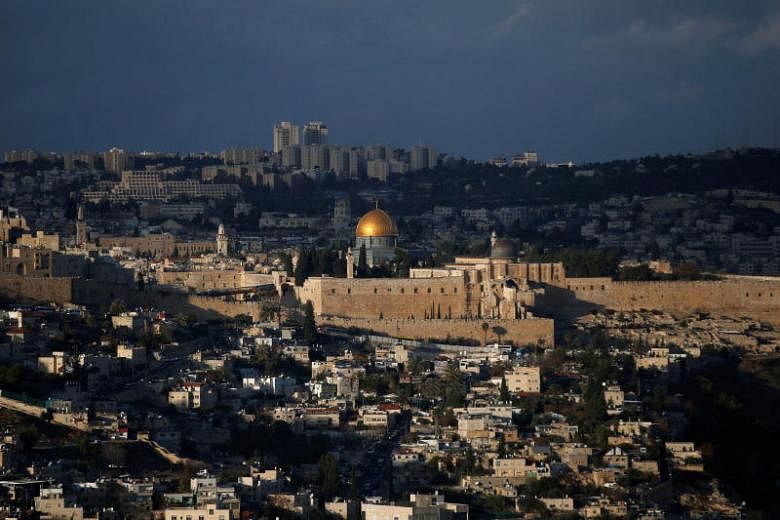TEL AVIV - Rarely has the future of the Middle East depended so much on the exact wording of a United States presidential address.
US President Donald Trump's speech, which will recognise Jerusalem as Israel's capital and thus depart from decades-old US policy, has many potential outcomes.
It could lead to widespread violence and mayhem, or cause a global shift of alliances.
On the other hand, it has the potential to reignite the peace process. Alternatively, it could simply change nothing and turn out to have been a tempest in a shisha.
The Arab world, which supports the Palestinians who claim East Jerusalem as the capital for their state, expects the worst-case scenario. It fears Mr Trump may declare Jerusalem to be "Israel's eternal, undivided capital".
Even worse, he could name a concrete date for an unconditional relocation of the US Embassy from Tel Aviv to Jerusalem.
That prospect has galvanised and united a hitherto-fractured Arab and Muslim world against him and the Jewish state. Palestinians have threatened to cut all diplomatic relations with Washington.
Dr Nabil Sha'ath, international affairs adviser to Palestinian President Mahmoud Abbas, declared this would bury the peace process for good. He told reporters Mr Trump "destroyed every chance that he will play to get the deal of century" - playing on how the former businessman described a peace treaty between Israel and the Palestinians.
In the West Bank, the Palestinian Authority declared three days of rage, organising mass protests in several cities that could easily turn violent. Printing presses in the West Bank churned out martial posters with armed men protecting "our Palestinian Jerusalem".
In Gaza, radical Islamist Hamas called for revenge, urging its followers to commit terror attacks.
Israeli security services are on high alert. A new wave of violence could easily lead to a conflagration that may engulf the whole region. That would lead to a diplomatic fallout.
DIPLOMATIC CONSEQUENCES
Turkey has threatened to cut its diplomatic relations with Israel. Other Arab states could follow suit.
Pragmatic Arab leaders, who have been eager to cooperate with Israel to check Iranian ambitions, could be forced to sever all ties with the Jewish state, lest they risk mass protests at home.
Positioning himself unequivocally on Israel's side, Mr Trump could isolate the US in the Middle East. Pro-Western forces would be publicly humiliated, strengthening extremists and other players such as Iran.
The appeal of other foreign powers such as Russia or China would increase. Arab states could turn to Moscow. President Vladimir Putin already wields huge influence after his successful intervention in Syria's civil war. He now seeks to expand his reach, striving to close a deal with Cairo to station Russian military planes in Egypt.
On the other hand, countries like Hungary have reportedly already told the Israeli foreign ministry that they intend to follow Mr Trump's example and move their embassies to Jerusalem, too.
OR A STROKE OF GENIUS?
Things also could turn out quite differently.
Sources in the White House want to assuage Arab fears, claiming Mr Trump's speech will contain goodies for the Palestinians as well. The US President will apparently publicly support a two-state solution, for the first time. Some contend this crafty businessman will not give Israel's Prime Minister Benjamin Netanyahu this tremendous gift for free. It could come with a demanding price tag, like the demand to commit his right wing government to the two-state solution, or make large concessions to the Palestinians.
Mr Netanyahu could hardly ignore Mr Trump's wish after he recognises Jerusalem. With a simple twist of rhetoric, such as declaring that he recognises "Jerusalem also as Israel's capital", Mr Trump could actually acknowledge Palestinian demands. Then, Arabs might rejoice, not rebel.
With a stroke of Genius, Mr Trump could reinvigorate a clinically dead peace process.
In the face of Arab outrage, some in Washington portray Mr Trump's decision not as a historic turning point, but "as recognition of an existing reality, and also of Jerusalem's Jewish history".
In fact, the US Congress passed a law in 1995 mandating the relocation of the embassy from Tel Aviv to Jerusalem - a de jure recognition.
Mr Trump's predecessors have deferred only the move, not repealed it. Moreover, the President would stress his commitment to keeping the current status quo in the city's holy sites and not be passing judgement on the fate of Jerusalem in a future Israeli-Palestinian peace deal, those sources claim.
And if Mr Trump declares - as expected - that the actual relocation will happen only in the distant future, nothing much will change on the ground.
The excitement about his speech would have been a storm in a teapot.
With such divergent options, one has to wait for its exact wording. Any twist can significantly impact the future of the Middle East.

